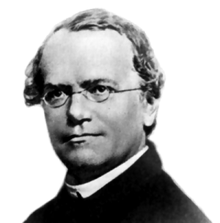
Back Wette van Mendel Afrikaans Mendelsche Regeln ALS وراثة مندلية Arabic Lleis de Mendel AST Mendel qanunu Azerbaijani Закони на Мендел Bulgarian মেন্ডেলীয় বংশগতি Bengali/Bangla Mendelovi zakoni BS Genètica mendeliana Catalan Mendelovy zákony dědičnosti Czech
This article has multiple issues. Please help improve it or discuss these issues on the talk page. (Learn how and when to remove these messages)
|

| Part of a series on |
| Genetics |
|---|
 |
Mendelian inheritance (also known as Mendelism) is a type of biological inheritance following the principles originally proposed by Gregor Mendel in 1865 and 1866, re-discovered in 1900 by Hugo de Vries and Carl Correns, and later popularized by William Bateson.[1] These principles were initially controversial. When Mendel's theories were integrated with the Boveri–Sutton chromosome theory of inheritance by Thomas Hunt Morgan in 1915, they became the core of classical genetics. Ronald Fisher combined these ideas with the theory of natural selection in his 1930 book The Genetical Theory of Natural Selection, putting evolution onto a mathematical footing and forming the basis for population genetics within the modern evolutionary synthesis.[2]
- ^ William Bateson: Mendel's Principles of Heredity - A Defence, with a Translation of Mendel's Original Papers on Hybridisation Cambridge University Press 2009, ISBN 978-1-108-00613-2
- ^ Grafen, Alan; Ridley, Mark (2006). Richard Dawkins: How A Scientist Changed the Way We Think. New York, New York: Oxford University Press. p. 69. ISBN 978-0-19-929116-8.